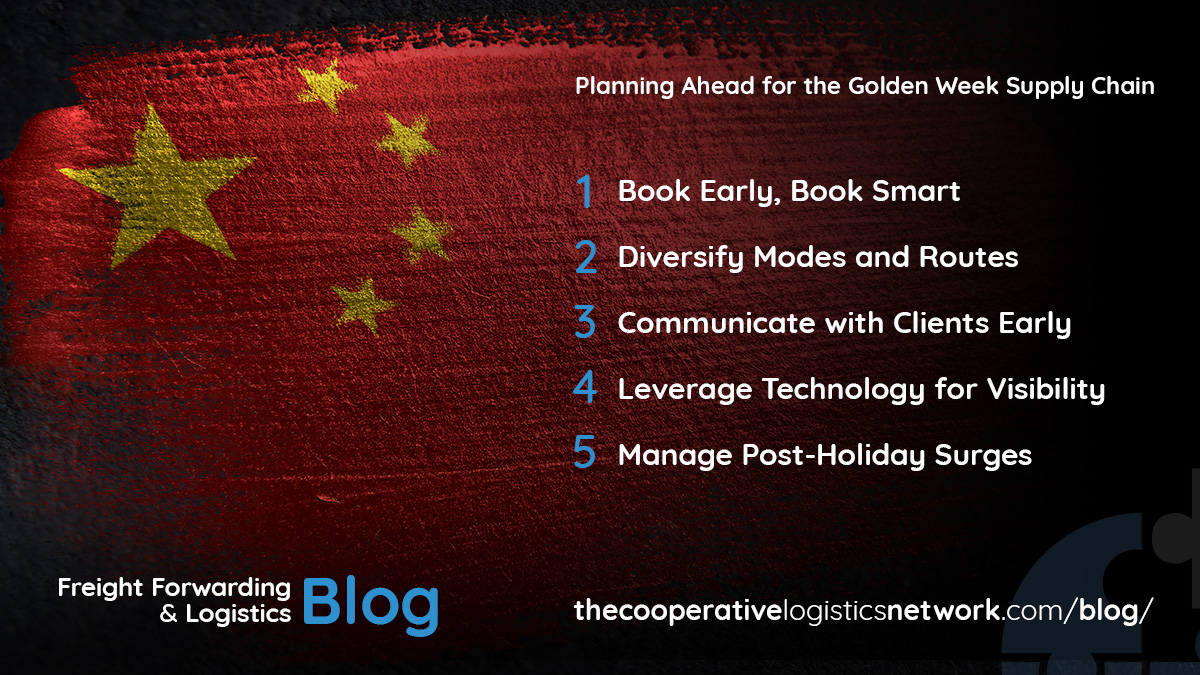Every October, China celebrates Golden Week, a seven-day national holiday that sees hundreds of millions of people travel, shop, and spend time with family. For freight forwarders, however, Golden Week is a logistical stress test. The Golden Week supply chain crunch can throw even the most well-planned shipments into chaos if forwarders aren’t prepared.
Let’s break down what really happens during Golden Week, how it impacts the flow of goods, and most importantly, what freight forwarders can do to minimize disruptions for their clients.
What Golden Week means for global shipping
Golden Week, held annually from October 1–7, marks the founding of the People’s Republic of China. During this period, factories shut down or reduce operations, ports operate with skeleton crews, and transport capacity becomes scarce. The result? A ripple effect across the global supply chain.
Ocean carriers respond to reduced demand by scheduling blank sailings (cancelled departures), often weeks in advance. While this helps carriers maintain rates, it means forwarders must scramble to find space on fewer available sailings. Air freight faces its own challenges, with limited capacity and surging rates as shippers rush to get goods out of China before the holiday.
The disruption doesn’t just last one week. Factories need time to ramp back up, meaning production delays can extend well into mid-October. For industries that rely on just-in-time inventory, this creates significant headaches, especially for retailers preparing for peak-season sales.

Why the Golden Week supply chain is so disruptive
Here’s the thing: the Golden Week supply chain disruption isn’t just about one country taking a holiday. It’s about timing and scale.
China is the world’s largest exporter. A full week of reduced operations means that global trade lanes particularly Asia–US West Coast and Asia–Europe see a sharp dip in volume, followed by a post-holiday surge. This creates an imbalance:
-
Before Golden Week: Shippers rush to move cargo out of China, creating space shortages and driving up rates.
-
During Golden Week: Cargo movement slows dramatically, leaving ports quieter than usual but creating backlogs at origin.
-
After Golden Week: A flood of cargo enters the system, overwhelming ports and inland transport networks.
Forwarders who aren’t ready for this cycle face missed cut-offs, delayed deliveries, and frustrated customers. That’s why planning several weeks ahead is critical.
Planning ahead for the Golden Week supply chain
The best way to navigate Golden Week is to think like a carrier and anticipate their moves. Here are a few proven strategies freight forwarders can use:
1. Book early, book smart
Golden Week blank sailings can wipe out significant capacity on major trade lanes. The earlier you book, the better your chances of securing space at competitive rates. Work closely with your carrier partners to lock in space allocations at least 3–4 weeks in advance.
2. Diversify modes and routes
If ocean space is tight, explore air freight or rail options for critical cargo. Multimodal solutions can help you bypass port congestion and keep supply chains moving. Consider using alternative ports such as Tianjin or Xiamen if Shanghai and Ningbo are heavily congested.
3. Communicate with clients early
Your customers need to know that Golden Week will affect their shipments. Share realistic timelines and suggest that they place orders early to avoid production and delivery delays. Proactive communication builds trust and helps set the right expectations.
4. Leverage technology for visibility
Digital tools that track cargo in real time can help you manage exceptions quickly. If a container misses a sailing, knowing right away allows you to rebook on the next available option.
5. Manage post-holiday surges
Plan for the rebound. Once factories restart, you’ll see a spike in bookings. Having pre-negotiated rates and space allocations for mid-October will help you handle the rush without paying exorbitant spot rates.
Golden Week supply chain and carrier behavior
Carrier strategies are a major factor in how Golden Week affects freight forwarders. This year, alliances like Ocean Alliance, THE Alliance, and 2M have already announced dozens of blank sailings through late September and early October. Their goal is to keep rates from crashing during the holiday lull but for forwarders, this means less capacity and more competition for available slots. In addition, carriers sometimes use this period to reposition vessels, which can create schedule changes on services that don’t appear directly related to China. These schedule disruptions can ripple across networks and impact shipments even if they originate outside of China. Understanding carrier tactics can help forwarders anticipate where capacity will tighten and plan accordingly.
The role of port congestion
Another major factor in the Golden Week supply chain crunch is port congestion. When too many ships arrive in quick succession after the holiday, berths fill up, causing waiting times that can stretch to days. In 2025, major Chinese ports like Shanghai, Ningbo, and Qingdao are already reporting high yard utilization, meaning backlogs could get worse before they get better. Forwarders should monitor port status updates and work with partners on the ground to make quick adjustments if delays appear likely. In some cases, rerouting cargo to less congested ports can save days of waiting.
Air freight: A pressure valve
While ocean freight gets most of the attention, air freight plays a crucial role during Golden Week. Many shippers switch to air for high-value or time-sensitive cargo, leading to rate spikes of 20–30%. For forwarders, securing block space agreements with airlines ahead of time is key to avoiding last-minute surprises. The good news is that air freight demand usually eases slightly during the actual holiday, offering a small window of opportunity to move urgent cargo before the post-Golden Week surge.
How being part of The Cooperative Logistics Network helps
Members of The Cooperative Logistics Network have an edge when navigating the Golden Week supply chain. With a vetted network of trusted partners across China and the rest of the world, members can quickly coordinate bookings, share capacity information, and access reliable local support.
This means they’re better positioned to secure space, reroute shipments when necessary, and communicate accurate updates to their customers. Annual meetings and strong member relationships also build the trust needed to handle peak season challenges smoothly.
Final thoughts
Golden Week may only last seven days, but its impact on the global freight market stretches for weeks. For freight forwarders, the key to surviving the Golden Week supply chain crunch is preparation: early booking, client communication, and a willingness to adapt to rapidly changing conditions.
By staying informed and using collaborative networks like The Cooperative, forwarders can turn what might feel like a crisis into an opportunity to demonstrate value, strengthen relationships, and deliver consistent results even in the most challenging weeks of the year.


